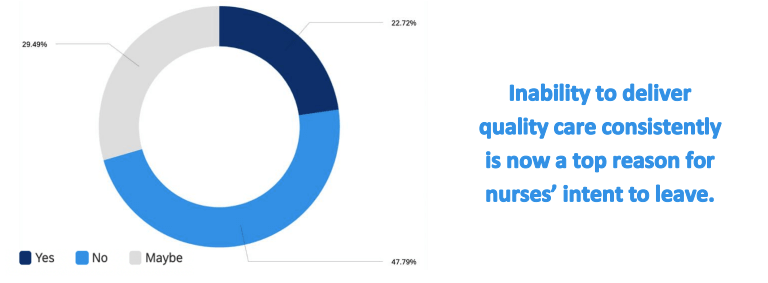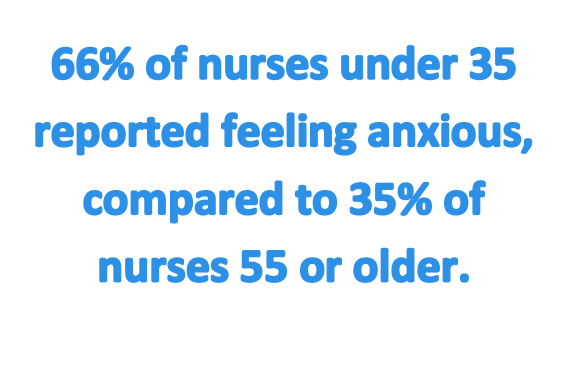With a large number of experienced nurses leaving the healthcare profession, ensuring our younger clinicians are ready to lead will be key to staff retention.
Imagine sitting on an airplane for your first flight. You are vibrating with excitement. All you can think about are the adventures that lie ahead. As you are orienting yourself with the plane, you look to your right and notice a sign that reads “emergency exit” directly beside your seat. The flight attendant begins the typical safety procedure speech.
When the flight attendant asks if you are able and willing to assist during an emergency, you take a quick inventory of your competence. You weigh 60 lbs, have limited mobility and English is your second language. You know without a doubt you can’t safely perform the duties. You say no, explain why and begin packing up your personal items, expecting to move. Instead, the flight attendant pats you on the back and says with a wink and smile, “you’ll be fine” and saunters away.
An experience like that would make headlines within minutes. The other passengers would vocalize their disapproval and concern. This story may even elicit laughter because the scenario painted seems a farce. Yet, it happens all the time. Not on airplanes, but in healthcare, where the stakes are high and people’s lives depend on competency.
Carol’s First Flight
We recently interviewed a new nurse who lives in the South; we’ll call her Carol to protect her privacy. She was willing to share her experience of being asked to “man the plane” when she didn’t have the needed skills or confidence. Like many of the nurses we talk to, she begins her story with excitement. The simple question of “why did you choose nursing?” induces a passionately articulated tale of wanting to help others, personal growth, and a desire to learn. She acknowledges like we all do once we pass the boards, that she knew real learning was just beginning.
She found a nurse residency program in a med-surg unit, spent 12 weeks in training, and then graduated. For those of you not familiar with residency programs in nursing, it’s extra education. Hospitals pay for your training and provide you with support so that newly graduated nurses are better prepared to care for patients. For many organizations, residency programs are a retention method – invest in your new employees and they will be loyal to you. Even if they transfer out of one department in the system, they can easily move to another.
After Carol completed her residency, she started working independently. Over the months she noticed that the six nurses in her residency program were disappearing, and the seasoned nurses were being replaced with travel nurses. Within months, she and one other nurse were the only core staff on the night shift for a 35-bed unit and she was the only nurse left from her residency program.
One evening, the unit manager approached her offering a charge nurse position, and like the passenger in the opening story, Carol took a quick inventory of her abilities and knew she was not ready for a promotion. She declined. On the next shift, she walked through the unit doors, and there on the whiteboard was “Charge Nurse” and her name. A metaphorical pat on the back and wink. Here is how her work experience spiraled, along with her mental health.

Taking A Nosedive
A recent survey reports that younger nurses are experiencing a heavy emotional toll due to the pandemic and ongoing staffing shortages. The data shows a correlation between age and perceived emotional health, with the majority of poor emotional health reported by nurses 35 years of age or younger.

Carol’s story is not unique. After spending years preparing for her dream job, she was quickly let down by her employer. She dreads going to work, occasionally crying on her drive to the hospital. She said, “it’s been emotionally upsetting – I dreamt of being a nurse and it’s not at all what I planned for it to be.” Not only is she dealing with the added stress of caring for patients and being forced into a leadership role, but she’s also spending time advocating for herself and pushing back against a leadership team that will not listen.
And we wonder why 52% of nurses are considering leaving their profession. It should come as no surprise that Carol is currently interviewing for a new position.
Pulling the Chute
We used to worry that nurses would ‘eat our young’. Now it’s almost as though we are throwing our young to the wolves and letting them be eaten. We are abandoning them when they need us the most. But here lies the generational differences: where those who are older would have toughed it out and stayed, this generation is saying “no”; they are opening the plane door, pulling their chute, and landing in positions where they don’t have to sacrifice their mental and physical health for a job. As leaders, how can we save our young?
The report also found that in terms of solutions there is a disparity between leadership perception and bedside nurse perception as to what actions are improving working conditions. In the end, no one is to blame. We are all trying to solve a difficult problem with limited time and resources. Maybe the first step is to sit down together and have real conversations. As leaders, we listen to what our younger nurses are telling us. And younger nurses, don’t be afraid to share your thoughts.
Tell us what you are doing at your organization to grow your ‘young’. And new nurses, tell us how your organization is committed to growing and developing you into a leader for tomorrow. And, of course, don’t hesitate to share your ideas if you think that there are other solutions that can or should be explored; we’d love to hear from you!

